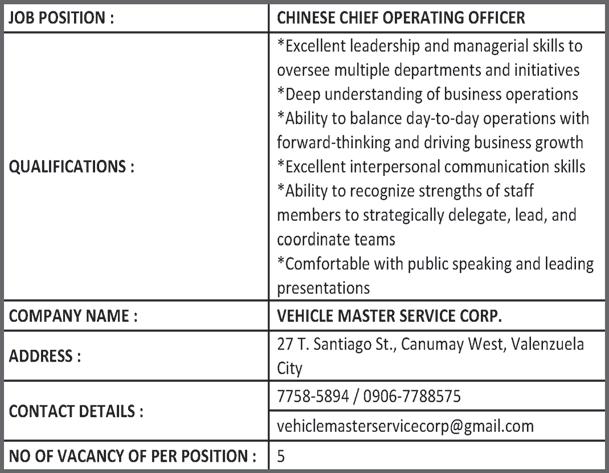
10 minute read
House bill declares ‘large-scale’ crop smuggling as act of economic sabotage
By Jovee Marie N. Dela Cruz @joveemarie
RESPONDING to the call of President Ferdinand R. Marcos Jr., a lawmaker has recently filed a bill declaring “large-scale” agricultural smuggling, hoarding, cartelization and profiteering, and other acts of market abuse as economic sabotage, even as smuggled agricultural products confiscated by authorities last year reached the P1.2-billion mark.
In House Bill 8600, or the AntiAgricultural Economic Sabotage of 2023, filed last Tuesday, Quezon 4th District Rep. Keith Micah Tan said his proposal seeks to amend Republic Act 10845, or the AntiAgricultural Smuggling Act of 2016.
Tan said RA 10845 was passed into law with the primary objective of protecting Filipino farmers and their families from the rise in agricultural smuggling in the country.
“Since the law’s passage in 2016, however, even if there have been several reports of seizure of smuggled products, there have been no prosecutions of individuals, groups, or corporations under the law. It may appear that some have mastered how to circumvent the law in order not to be punished,” he said.
During his second State of the Nation Address (SONA), the President asked Congress to pass amendments to the Anti-Agricultural Smuggling Act.
With this appeal from the President, Tan said, obviously, RA 10845’s potential to finally end illegal activities that sabotage the country’s economy and the livelihood of farmers had not been fully utilized over the years.
“The present condition of our farmers and the rising price of agricultural products because of their scarcity reflect the failure of national government agencies to fully implement the law,” he said.
According to Tan, the Economist’s 2021 Global Food Security Index (GFSI) reveals that the Philippines ranked 64th out of 113 countries in terms of four dimensions of food security: food availability, food accessibility, food utilization, and stability.
“The difficulty of the country to cope with other countries in terms of food security is apparent in the rising prices of basic commodities and the scarcity and shortage of such commodities,” he said.
“Also, the country has been experiencing the highest price of onion in recent history—an all-time high of P700 per kilogram. This was made worse by reports of smuggling and price manipulations by unscrupulous people,” he said.
Based on the records of the Bureau of Customs, he said a total of P1.2 billion worth of smuggled agricultural products have been confiscated in 2022.
“Millions worth of revenues that the government is losing as a result of smuggling, which is revealed to be P250 million per year,” the lawmaker said.
In light of this, Tan said it is high time to introduce amendments to the law, in order to address and hopefully end not only smuggling, but also the issues of hoarding, profiteering, and cartelization of agricultural products.
The proposed legislation will consider as economic sabotage the hoarding, profiteering, and cartel of sugar, corn, pork, poultry, garlic, onion, carrots, fish, and cruciferous vegetables in the amount of P1 million or rice in the amount of P10 million.
Moreover, in order to strengthen the enforcement and implementation of the law, Inter-Agency Council on Economic Intelligence will be created under the proposal.
This will be co-chaired by the Department of Agriculture, the Department of Trade and Industry, and the Bureau of Customs, and will include the Department of Justice, National Bureau of Investigation, Department of the Interior and Local Government, the Philippine National Police, the Philippine Competition Commission, National Security Council, and National Intelligence Coordinating Agency.
The bill said the penalty of life imprisonment and a fine of twice the fair value of smuggled agricultural products or products subject to hoarding, profiteering, or cartels, and the aggregate amount of the taxes, duties, and other charges avoided, shall be imposed on any person who commits any of the acts enumerated under the proposal.
Creation of RE ‘highway’ to boost PHL power generation pushed CIAP bats for adoption of ‘standardized’ set of contracts in private construction business
By Cai U. Ordinario @caiordinario
THE creation of a reliable “highway” for renewable energy (RE) can fast track the government’s efforts to address the country’s power woes, according to experts.
In a recent forum, industry experts have also pointed to the need for a reliable highway that can accept variable RE and reliably deliver electricity to households and industries.
University of the Philippines College of Engineering Associate Dean Rowaldo Del Mundo said developing RE, such as solar takes only a year, while transmission lines takes 10 years to build.
“Our power system is not ready to accommodate more variable renewable energy [at the moment]. Since we would like to obtain more renewable energy, then we need to focus on developing our transmission system; not only the main grid but actually how to interconnect the many islands in the country,” Del Mundo said.
“Unfortunately, there is this big problem with the lead time. If you decide to put up transmission [lines] today, that means you will have it 10 years from now, whereas if you decide to put up a solar power plant, you can have it next year,” he explained.
He said the highway would be helpful since the Philippines looks to modify its power generation mix to reflect 50 percent renewables and 50 percent non-renewables by 2040.
Department of Energy (DOE) Chief Science Research Specialist Danilo Vivar said the DOE collaborated with the Department of the Interior and Local Government on a circular that serves as a guideline for local government units (LGUs) and their role in developing energy projects.
These efforts, Vivar said, includes Energy Virtual One-Stop Shop (EVOSS), which is “an online system that allows the coordinated submission and synchronous processing of all required data and information, and provides a single decision-making portal for actions on applications for permits or certifications necessary for, or related to, an application of a proponent for new power generation, transmission, or distribution projects.”
Philippine Independent Power Producers Association Inc. President (PIPPA) Anne Montelibano lamented that while there is recognition of the benefits of artificial intelligence (AI) and the use of high technology, stable power remains a problem.
Montelibano said there are still brownouts that disrupt industries, particularly those that use AI and high technology. There is a lot of optimism in developing these industries because many Filipinos have the skills to support them.
“Having a good system and [making] use of all those technologies already assumes that you have [a] good base to make it work,” Montelibano said, noting how this would entail balancing intermittencies with a good baseload made up of power plants that can run 24/7.
She also cited the permitting process as a major concern in the power sector, especially as it can be a roadblock for investments in much-needed new generation capacities.
“We need to make it friendlier, faster, [timely], predictable, [and] reliable. Before the EVOSS, it took around 2,000+ signatures just to put up a project. After the EVOSS, we have greatly reduced the number of processing days and the number of signatures that need to be done [to 1,700]. We greatly thank the DOE for [EVOSS], but obviously, there is always room for improvement,” she said.
The European Chamber of Commerce of the Philippines (ECCP) cohosted the roundtable discussion entitled Powering up: The race to energy security, moderated by the Chamber’s Renewable Energy and Energy Efficiency Co-Chair, Ruth Yu-Owen.
The ECCP is a bilateral foreign chamber that promotes European interests in the Philippines and vice versa. With nearly 800 members, the ECCP offers a strong business network that holds great potential in translating to tangible business opportunities.
THE Construction Industry Authority of the Philippines (CIAP) is pushing for the adoption and use of a “standardized” set of conditions of contracts for private construction.

CIAP said this could prevent problems such as breaches in contract in construction, even as the Construction Industry Arbitration Commission (CIAC) confirmed some of the arbitration cases lodged with them are related to breaches of contracts.
“These disputes have a dire effect on micro and small domestic/local contractors, who, in good faith, rely on these agreements with their clients, unknowingly engaging in unfair and/ or inequitable contracts,” CIAP said.

The CIAP, through one of its implementing arms, the Philippine Domestic Construction Board (PDCB), approved and published the revised CIAP Document 102, otherwise known as the Uniform General Conditions of Contract for Private Construction.
The CIAP Document 102 is intended to provide guidance to parties in drafting their respective private construction contracts.
The provisions are intended to serve as the recommended procedures, guidelines, and criteria to be used in the implementation of the contract.
This is especially the case in the interpretation of any ambiguities and omissions of stipulations in the contract.
DTI Undersecretary and CIAP Alternate Chairman Ireneo Vizmonte said that CIAP Document 102 encapsulates the recommended terms and conditions in construction contracts.
Vizmonte said the document also reflects the usages, customs, and best practices in the construction industry.
Atty. Marco Maat, DTI-CIAP executive director, said that CIAP recognizes stronger collaborations between government and the private sector to initiate compelling policy reforms such as the CIAP Document 102.
“We are hopeful that this initiative will greatly contribute to the enhancement of contractual relations in the construction industry, especially in private contracting,” Maat said.
Through the signing of a memorandum of agreement (MOA) last week, the government and the private sector agreed to engage in active promotion for the adoption and use of the document among industry stakeholders.
The launch and commitment pledge for CIAP Document 102 marks the rollout of its advocacy campaign.
This will involve the conduct of a series of promotional activities, comprehensive training on CIAP Document 102, and institutionalization of the document as part of contract management courses for engineering students. Cai U. Ordinario

Revised procurement law and auditing code to empower LGUs–Sen. Escudero




By Butch Fernandez @butchfBM
SENATOR Francis Escudero expects timely changes in an amended procurement law reforms to further empower local government units (LGUs).
Affirming support for the timely enactment of the remedial legislation awaited by LGUs, Escudero foresees early passage of a new procurement law and auditing code that President Ferdinand R. Marcos Jr. tackled in his 2nd State of the Nation Address, agreeing these amendments would help facilitate decentralization and devolution process that will further empower LGUs.
Escudero envisioned that soon as Congress opened its second regular session this week, the measure should be prioritized with “LGUs already prepared” for full devolution under Republic Act 7160 or the Local Government Code of 1991, backed by the Supreme Court ruling on the Mandanas-Garcia petitions.
“Amending old laws on government procurement and audit process are v ery timely as LGUs prepare for full devolution,” Escudero said.
Reminiscing the time he served as provincial governor, “I experienced how tedious the processes were and most of the time, they really impede on local governance and hamper the delivery of services to our people.”
Escudero recalled: “Angpag-amiyendang mgabatasnaitosalalongmadalingpanahon ay makakatulong sa ating mga LGUs upang lalo pang mapabuti ang pagseserbisyo sa ating mga mamamayan,” he added.
President Marcos said the passage of the two measures would make government procurement and auditing “more attuned to these changing times” as it prepares for the decentralization and full devolution to LGUs as mandated by the Supreme Court Ruling on the Mandanas-Garcia petitions.
The High Court decision gave LGUs a just share of all national taxes collected from the Bureau of Internal Revenue (BIR), and fully transfers or devolves the delivery of basic services to LGUs.
“We will give effect to the mandate of the Constitution and the Local Government Code, as clarified by the Supreme Court very soon. Almost all the required Devolution Transition Plans of the LGUs are done,” the President said, reminding LGUs “to fully prepare them for optimal devolution, the necessary technical and financial assistance is being extended to our local governments,” Marcos added.
‘Shore It Up!’ enhances Metro Pacific’s environmental advocacy on 15th year
METRO Pacific Investments Foundation (MPIF), the corporate social responsibility arm of leading infrastructure conglomerate Metro Pacific Investments Corp., marks its 15th year in helping preserve and protect the country’s marine and coastal ecosystems through its flagship program, Shore It Up! (SIU).
To celebrate this milestone, MPIF will host a multisectoral forum titled “Enlarging Our Blue Footprint for Philippine Marine Biodiversity Conservation” on July 28 at the Westin Manila Hotel in Pasig City.
The event will see the convergence of environmental stakeholders who will draft a joint agenda, to be led by Senate Committee Chair on Environment and Natural Resources
Sen. Cynthia Villar and Bohol congressman
Rep. Edgar Chatto, who will talk on Climate Emergency and Multi-Actor Partnership (MAP) on Climate and Disaster Risk Financing and Insurance, respectively.
Also to be presented are the government’s Ridge to Reef Priority Program by Department of Environment and Natural Resources secretary
Maria Antonia Yulo-Loyzaga, and Sustainable Ecotourism by Department of Tourism Undersecretary Shereen Gail Yu-Pamintuan.
The private sector will be represented by Metro Pacific chairman, president and CEO Manuel V. Pangilinan, and MPIC CFO, CRO, and CSO Chaye Cabal-Revilla who will outline the MVP Group’s Sustainability Practices through the “Gabay Kalikasan: Making Better Choices for Tomorrow and Becoming Catalysts for a Cleaner, Greener, and More Resilient Planet for Every Filipino.”
“Our archipelago is teeming with worldrenowned hubs of biodiversity and requires a strong support system from the private sector when it comes to preservation and conservation. We at the Foundation want to ensure that we play our part in future-proofing what we have and help mitigate climate change,” said MPIF president Melody del Rosario.
The half-day forum will also feature eminent speakers, marine scientists, local government officials, and environmental experts who will share their insights on empowering communities through nature-based solutions and sustainable development.
An event highlight will be an in-depth discussion on safeguarding Tubbataha Reefs Natural Park, a UNESCO World Heritage site and the country’s largest marine protected area. The talk will be delivered by the Tubbataha Management Office Protected Area Superintendent, along with Shore It Up! advisors and experts.
Since its inception in 2009, Shore It Up has grown from a simple underwater and coastal cleanup initiative to a comprehensive environmental stewardship program. It now extends its efforts to vast mangrove forests, marine protected areas, and wetlands of national importance, benefiting both the ecosystems and the communities within them.
In recent years, SIU has supported two Ramsar Wetlands of International Importance: the Las Piñas—Parañaque Wetland Park in Manila Bay and the Tubbataha Reefs Natural Park in Cagayancillo, Palawan.
The program has also made significant contributions to key coastal areas, among them Mabini, Batangas; Alaminos City, Pangasinan, Del Carmen in Siargao Island, Surigao del Norte; Medina, Misamis Oriental; Cordova, Cebu, and Subic Bay.
Over the past 15 years, SIU has mobilized over 85,000 volunteers from Metro Pacific firms, government agencies, local government units, law enforcement agencies, community organizations, civil society groups, dive industry stakeholders, and public elementary schools.







